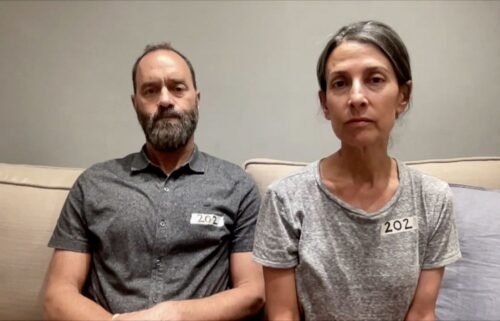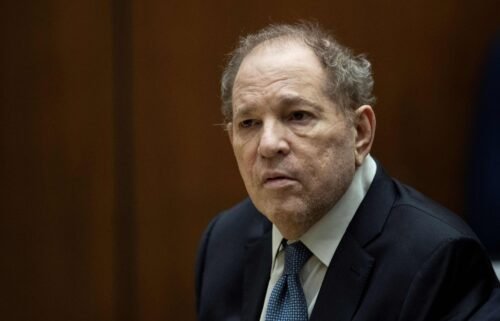Bans on chokeholds for federal officers latest in nationwide push to hold police to a ‘higher standard’

By Emma Tucker, CNN
The Justice Department announcement Tuesday that federal law enforcement officers will be banned from using neck restraints during arrests and using no-knock entries while executing warrants except in rare cases is part of an ongoing focus on police accountability at local, state and federal levels.
It’s a significant policy that addresses two aspects of police accountability for officers under federal jurisdiction, but state and local governments have already made these changes over the past two years. The use of neck restraints and no-knock warrants have resulted in high-profile in-custody deaths in recent years that have prompted calls for both techniques to be banned.
In the year and four months since George Floyd was killed by Minneapolis police officer Derek Chauvin, state and local governments across the country have ramped up efforts to hold officers accountable for misconduct and prevent incidents of police brutality against citizens.
There is more scrutiny of police contracts, and state legislatures have pushed ahead with eliminating qualified immunity and have instituted changes to policies on no-knock warrants and chokeholds. In cities such as Aurora, Colorado, Elijah McClain’s death two years ago prompted new state laws addressing chokeholds and the use of the powerful sedative ketamine to prevent unnecessary deaths and increase accountability for law enforcement.
State Attorney General Phil Weiser, a special prosecutor appointed by Colorado Gov. Jared Polis last year, released the findings of a year-long investigation into the Aurora Police Department on Wednesday. The investigation found that the agency “has a pattern and practice of racially biased policing, using excessive force, and failing to record required information when it interacts with the community,” the report states. Weiser will seek a federal consent decree that will require “specific changes and ongoing independent oversight,” his office announced.
Since May 2020, 47 states and Washington, DC have enacted 390 new laws that address policing policy, and all 50 states and DC have collectively introduced 3,120 laws during that period but not all were enacted, according to the National Conference of State Legislatures (NCSL). These laws address the proper restraint of suspects, how warrants are served, the duty of officers to intervene, and body camera requirements.
“Floyd’s case did bring to light a lot of very critically important issues as it relates to accountability for police,” said Charles Ramsey, former DC and Philadelphia police chief and a CNN law enforcement analyst. “Police do need to be held to a higher standard, there does need to be strict accountability.”
Seven states, including Colorado, Massachusetts and Connecticut, have enacted changes to qualified immunity, a controversial federal doctrine established by case law that can shield officers and other government employees from civil liability. A total of 24 states have restricted or banned the use of chokeholds and other neck restraints between May 2020 and May 2021, and 11 states have made changes to no-knock warrants in that time period, including Virginia, Illinois and Massachusetts, according to the NCSL.
In Louisville, Kentucky, where police killed 28-year-old Breonna Taylor in a botched drug raid, the mayor and the city’s police union released tentative contract agreements last week that include mandatory drug testing for officers involved in critical incidents and the highest single-year wage increase in the department’s history. Experts say contracts between police unions and members have come under greater scrutiny since Floyd’s killing, as reform advocates argue contract protections strain police and community relations and serve as hurdles to accountability and discipline.
“The negative consequence of what we’re seeing now is the tendency for people to paint all police officers with the same brush,” said Ramsey. “We’ve allowed the few to define the many and that’s a consequence, but in the long run, it’s going to benefit the profession because we have to rid our ranks of individuals who just don’t belong there.”
Use of no-knock warrants fraught with risk
Several key issues have been the target of police reform efforts, including the heightened attention to the duty of officers to intervene when they see fellow officers engaged in misconduct or excessive force, more officers being equipped with body worn cameras, restrictions on no-knock warrants, and departments moving to ban neck restraints.
The DOJ’s policy change this week, which applies to federal agents, and local and state officers serving on task forces, bans both chokeholds and “carotid restraints” except in cases where officers are authorized to use deadly force. The department acknowledged that “the use of certain physical restraint techniques — namely chokeholds and carotid restraints — by some law enforcement agencies to incapacitate a resisting suspect has too often led to tragedy.”
On the federal level, the George Floyd Justice in Policing Act includes changes to the qualified immunity doctrine and limits on no-knock warrants, chokeholds and carotid restraint holds, but bipartisan negotiations have been largely stalled this summer with little progress due to several key sticking points.
Qualified immunity, which can only be abolished nationally by the Supreme Court or Congress, effectively protects state and local officials, including police officers, from personal liability unless they are determined to have violated what the court defines as an individual’s “clearly established statutory or constitutional rights.” The doctrine can be used only in civil cases, not criminal, and allows victims to sue officials for damages only under those circumstances.
Republican Sen. Tim Scott, a lead negotiator in talks to reach an agreement on the bill, told reporters this week it’s not qualified immunity that’s holding up the discussions right now, but instead “definitions on things we want to see.”
Thor Eells, director of the National Tactical Officers Association, has argued against the use of no-knock warrants except in rare cases because they’re fraught with risk. He said three of the four potential outcomes of high-risk warrant service inside someone’s house — surrender, an officer shot, an officer shooting someone, or a suspect shooting themselves — are negative, and officers should try to avoid serving warrants that way.
That could mean using surveillance teams to make sure a house is empty during service and arresting someone during a traffic stop or when they’re otherwise away from their home, he said.
But a blanket ban on no-knock warrants isn’t helpful either, he said, because there are times when it’s appropriate.
“There are a lot of considerations that go into warrant service, to mitigating risks,” he added. “To just have an outright prohibition on one tool doesn’t necessarily make things safer.”
Between May 2020 and May 2021, 11 states have made changes to no-knock warrants, including Massachusetts, Illinois, Kentucky, Maryland, and Virginia.
Like much of law and policy governing the way police do their jobs, there is no single national standard for training, education, and approach to warrant service. Eell’s association has a standard, but it’s not binding and each of the thousands of police departments across the country are free to develop and follow their own rules based on what’s allowed by state law.
Generally, though, best practices would dictate officers finding some way to avoid serving no-knock warrants, even if a judge approves an application asking to be served that way. Officers are also taught to prioritize, in order: hostages, non-involved citizens, other law enforcement, and then the suspect. Drugs, property or other evidence is the last priority in warrant service, he said. The goal is to minimize the risk of any violence.
Eells said that so much went wrong the night of the Taylor raid that he described reviewing that as a “where do you start” situation. But a blanket ban on no-knock warrants — whether by department policy, change in state law, or by district attorneys not approving those requests before they get to judges — does not make communities any safer.
Police unions seen as an obstacle
Police unions have become “far too powerful” over the years and make it difficult to hold officers accountable for misconduct and rid police forces of problem officers, Ramsey said.
Bill Johnson, the executive director of the National Association of Police Organizations, a coalition of police unions, said union contracts with the city or agency they serve have come under “great scrutiny” since Floyd’s death in May 2020.
“Legislation pending or proposed in Congress would restrict contracts that the bill sponsors feel somehow interfere with civil rights investigations,” Johnson said. “From our point of view, contracts do no such thing. In fact, cannot do such a thing, legally.”
Johnson said he is not surprised about the increase in officer pay in Louisville, adding that the “constant attacks on police officers, physical, political, societal, verbal, and the consequent loss of officers through attrition and resignation/retirement has led to this.”
The tentative contract agreements released by the Louisville Metro Government and the Fraternal Order of Police include 9% raises to sworn LMPD personnel in the fiscal year 2022 and 3% raises to sworn LMPD personnel in the fiscal year 2023, according to an announcement from both parties. It represents the “highest single-year wage increase in LMPD history for LMPD sworn personnel,” the document says.
The tentative contract also requires mandatory critical incident drug and alcohol testing for officers and refusal to comply could result in termination, according to the document. As part of the process for collective bargaining, members of the union will vote on the agreements and, once approved, they will be reviewed by the City Council and sent to the public for feedback.
The contract negotiations have been underway since Taylor was killed. Taylor’s death has prompted cities across the country to move to ban or rein in no-knock, forcible-entry raids frequently used to serve narcotics search warrants.
Public criticism of the Louisville contract did result in a few positive changes, but they pale in comparison to other cities such as Indianapolis, Cincinnati and New York City, that give officials more discretion to discipline and lay off officers accused of misconduct, according to Ariana Levinson, a labor law professor at the University of Louisville Brandeis School of Law who has been studying LMPD’s contracts.
Levinson said the contract’s favorable changes include no longer allowing officers to review body camera footage before being interviewed by investigators, eliminating the provision that allows non-criminal complaints pending investigation to be destroyed after 90 days, and allowing for officers to be surveilled if they are under investigation for misconduct.
But several problematic provisions were not substantially changed, Levinson said, including a prohibition on layoffs and requiring egregious behavior for an officer to be suspended without pay.
“It’s great that we got three changes, but if we get three changes every two or five years, it’s going to take a decade to make significant change,” Levinson said. “The people in the communities are having to deal with this police misconduct and it’s not acceptable. It shouldn’t take a decade of incremental change to fix it.”
Passage of Colorado bills ‘monumental’
Three Aurora, Colorado, police officers and two paramedics were each indicted on charges of manslaughter and criminally negligent homicide as part of a 32-count indictment last week in the death of McClain, a 23-year-old Black man who was stopped by police while walking home from a store, placed in a carotid hold and then injected with ketamine.
Mari Newman, a lawyer for McClain’s family, told CNN that the indictment against the officers would not have happened without the national attention that was brought by the death of Floyd.
“These indictments here in Colorado serve not just as a reminder to the law enforcement officers here but across the entire country that they are not above the law,” Newman said.
On August 24, 2019, Aurora officers responded to a call about a person wearing a ski mask and confronted McClain, who was walking home from a convenience store, according to an independent investigative report. The officers tried to physically restrain him, which caused a struggle. McClain was placed in a carotid control hold twice and briefly lost consciousness, the indictment states.
The two Aurora Fire paramedics later arrived at the scene and diagnosed McClain with “excited delirium” without checking his vital signs, talking to him or touching him, the indictment says. The paramedics injected McClain with a dose of ketamine based on an estimate that he was 200 pounds, when he weighed 143 pounds, the documents say.
Before the officers and paramedics were indicted, state lawmakers passed three bills aimed at increasing accountability and preventing a repeat of the police encounter that led to McClain’s death. Under House Bill 1251, which Gov. Polis signed into law this year, an emergency medical service provider can only administer ketamine if they first weigh the individual, are trained in advanced airway support and have equipment to monitor their vital signs.
House Bill 1250 requires law enforcement agencies to develop protocols in conducting any investigation involving “the discharge of a firearm” that resulted in injury or death.
Under Senate Bill 217, police are banned from using chokeholds and an officer is required to intervene when another officer is using “unlawful physical force.” Additionally, officers cannot use deadly force to apprehend a person who is “suspected of only a minor or nonviolent offense” and if the person poses an “immediate threat” to the officer or public, the law states.
“What we have passed in Colorado is monumental,” said Rep. Leslie Herod, a Denver Democrat who said she spearheaded the three bills with the help of McClain’s mother, Sheneen McClain. “Had we not passed those bills we still would not have a path for justice for Elijah because the case was initially dropped multiple times. It really took that public outcry and the policy change to get to where we are today.”
Herod told CNN that district attorneys have filed seven charges against five officers since Senate Bill 217 was passed due to the various accountability-driven provisions such as failure to intervene and report use of force incidents.
Attorney General Weiser’s investigation into the Aurora Police Department found “statistically significant racial disparities — especially with respect to Black individuals — in nearly every important type of police contact with the community, from interactions to arrests to uses of force,” according to the report.
Aurora Police Chief Vanessa Wilson responded to the findings of the investigation, saying the department remains “committed to cooperation and seeking solutions which keep the best interests of our community and public servants at the forefront.”
Wilson said the department began implementing changes over the past 21 months while the investigation was ongoing, which she said improved policing, de-escalation training, community outreach and engagement.
Rep. Herod told CNN that there is “still work to be done because law enforcement has been able to be shielded by law enforcement for so long for generations, but it’s in the fabric of our criminal code. It’s in the fabric of our statutes.”
The-CNN-Wire
™ & © 2021 Cable News Network, Inc., a WarnerMedia Company. All rights reserved.
CNN’s Peter Nickeas and Jenn Selva contributed to this story.




